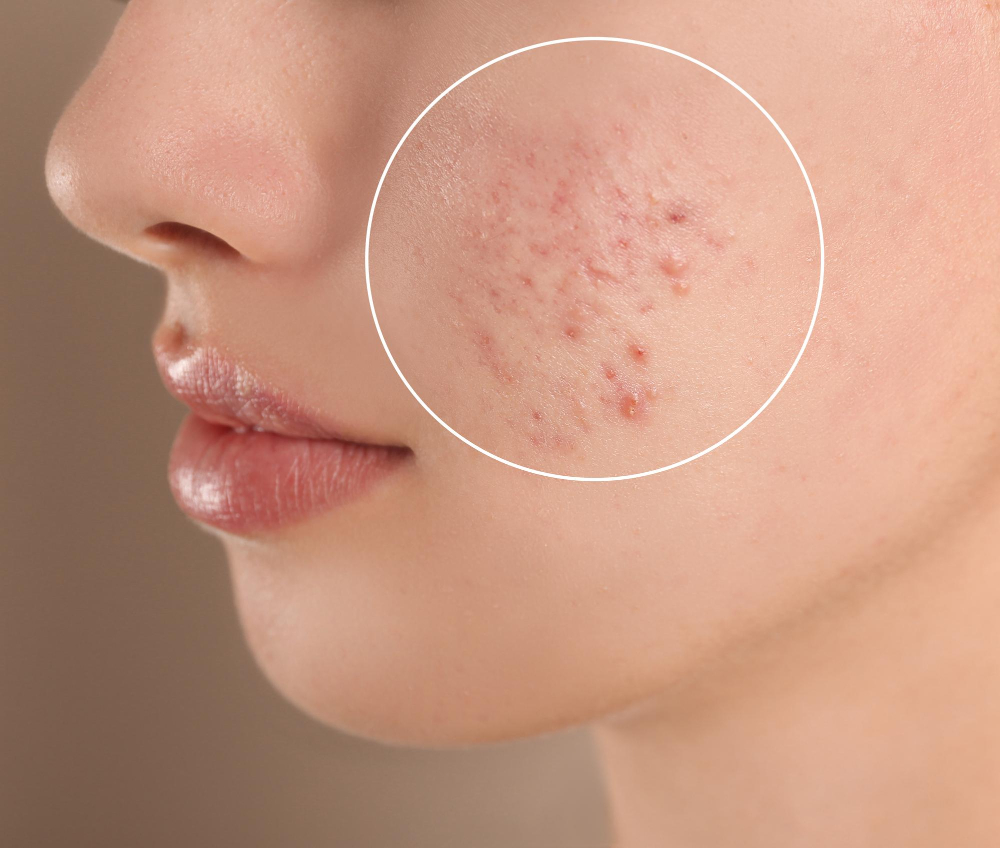Acne is a chronic inflammatory skin condition that more than 80% of people face at a certain stage of their lives – most often between the teenage years. The condition does not pose any direct danger, but if left untreated over time, it leaves unpleasant scars on the skin.
In general, the pathogenesis of acne is related to two main mechanisms – overproduction and obstruction of skin sebaceous glands, which is superimposed on bacterial infection. The etiological and risk factors for the appearance of acne are various and numerous – hormonal imbalance, emotional stress, poor nutrition, poor hygiene, use of make-up, hot and humid climate, and “squeezing” of pimples. It is good to mention at the outset that “squeezing” acne is an extremely incorrect and potentially dangerous behavior, especially when it comes to acne on the face.
The area around the eyes, nose, and lips is trivially known in medicine as the “deadly triangle”, due to the possibility of retrograde infection and the development of meningitis, encephalitis, brain abscesses, involvement of various facial nerves, involvement of the cavernous sinuses, etc. from inflammatory processes in the corresponding triangle.
The reason is that complex venous communication takes place in this area with ophthalmic veins, sinus veins, etc. In any case, this is a possible, but extremely rare and unfavorable plot and fate of a bud. Still, don’t touch this area!
In all cases of acne, timely consultation with a specialist dermatologist is important, as it can avoid acne complications and scarring.
1. Hormonal imbalance
The role of various hormones has been proven in the pathogenesis of acne. Androgens stimulate the secretion of the sebaceous glands and thus greatly increase the risk of acne. In this sense, patients with polycystic disease, e.g. often have acne. Another common hormone-related pathology that can cause acne is Hashimoto’s thyroiditis.
Other pathologies that can cause acne are gluten enteropathy, lactose intolerance, and many other gastroenterological conditions. Chronic liver strain can also have acne as a manifestation.
2. Diet
It has been proven that a diet rich in foods with a high glycemic index is at high risk for acne – pasta, white bread, sugar, white rice, chocolate, etc. Foods rich in trans fats (containing palm and coconut oil) and dairy products have also been shown to be associated with acne breakouts.
Useful for acne is a diet rich in “slow” carbohydrates (whole grains), fruits and vegetables, brown rice, quinoa, lean meats, fatty fish – salmon, trout, mackerel, tuna, carp, herring, etc., nuts. A diet rich in omega fatty acids is associated with a reduction in inflammatory processes in the body.
3. Zinc
A zinc-rich diet and zinc supplementation have also been associated with improving acne and reducing the risk of developing it. Foods rich in zinc are meats, shellfish, legumes (beans, lentils, chickpeas), seeds, nuts, eggs, whole grains, etc.
4. Vitamins A and E
A diet rich in vitamins A and E is also associated with a lower risk of acne and improvement in the condition. However, it is not recommended to use vitamin A alone without consulting a doctor. High doses of vit. And they are toxic and over time, uncontrolled intake can lead to hypervitaminosis and toxicity. Rich in vit. A and E are peppers, spinach, broccoli, carrots, blueberries, blackberries, mangoes, avocados, kiwis, and many, many more, which you can always check out on the internet.
5. Makeup
Dear girls and women, with irritated skin, avoid the application of make-up and any kind of beautifying ointments, which obstruct the already clogged skin pores and favor and intensify inflammation.
6. Medications
Some medications – anabolic steroids, lithium, bromides (which are mild sedatives), barbiturates, anticonvulsants, etc. can cause acne.
7. Emotional stress
Emotional stress plays a role in the etiology of much of human disease, and we often overlook this fact. In any case, improving the emotional state, nutrition and physical activity improve the overall health and immune status of the person.
8. Hygiene
There is a balance in terms of hygiene and skin health – infrequent and poor washing increases the risk of acne. However, the same thing happens with too frequent washing and using soap, which dries the skin and stimulates inflammatory processes. Wash your face no more than twice a day with products that are specifically indicated for this.
Also avoid the use of alcohol and alcohol preparations, which strongly dry the skin. In terms of hygiene, it is very important to wash your hands regularly and avoid touching your face… even more so during a pandemic when it is already fashionable. Data show that a person touches their face on average about 2-3 thousand times a day. So wash your hands – you won’t be able to handle not touching.
9. Warm and humid places
Avoid prolonged exposure to the sun, sweating, and damp places. In this sense, steam baths, saunas, and other hellish training and health-threatening sites are prohibited.
10. Do not squeeze and touch the acne
Except for the beginning, we will repeat it for the end. Don’t do it. You increase the area of bacterial contamination, spread the acne, and may give yourself a serious infection.
The material is informative and cannot replace consultation with a doctor. Before starting treatment, you must consult a doctor.
